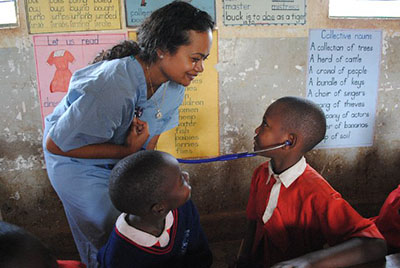 In June, 2008 BHP alumnae Savitha Bonthala, will receive a doctor of osteopathic medicine and a master’s in public health degree from the Touro University College of Osteopathic Medicine. Her involvement with the American Medical Women’s Association over the past few years, has allowed her to travel to Uganda to help deliver medical aid. We recently visited with Savitha to learn more about her experiences in global healthcare, and what she has been doing since graduating from the BHP.
In June, 2008 BHP alumnae Savitha Bonthala, will receive a doctor of osteopathic medicine and a master’s in public health degree from the Touro University College of Osteopathic Medicine. Her involvement with the American Medical Women’s Association over the past few years, has allowed her to travel to Uganda to help deliver medical aid. We recently visited with Savitha to learn more about her experiences in global healthcare, and what she has been doing since graduating from the BHP.
How did you become interested in going into the medical field?
What got me interested in medicine originally was my interest in global health. I was born in India and raised in the United States, and when I went back to visit seeing the poverty there was astounding and I felt a calling to work in global health.
What is osteopathic medicine and what do you hope to do with your degree after graduation?
Osteopathic Medicine (DO) is similar to Allopathic medicine (MD) but in osteopathic training, you also learn how to use your hands to diagnose and treat different chronic, or acute issues of the body. We focus on treating the whole patient, in terms of body, mind and spirit. It is a holistic and comprehensive approach to treating a patient. In addition to a holistic approach, I would like to do more public health work, especially in terms of education and children, because that is where I think I will make the biggest impact.
What have you been working on through your involvement in the American Medical Women’s Association?
We promote gender equality and medicine and I am in a fellowship through the association. I am currently the Global Health Chair for the association, so I help promote and expand global health opportunities for students who are members of the association. I am currently one of eight female medical students chosen from across the country to participate in the Anne C. Carter Global Health Fellowship. I was granted the fellowship in 2010 and will remain a fellow until I graduate. It has allowed me to travel to Uganda in February 2012. I went to Uganda for two weeks and worked in a small primary care clinic. I treated people of all ages, from infants to those who were well into their 90s.
What kind of health issues were you seeing frequently?
We had a lot of children with malaria come into the clinic. It was our number one pediatric diagnosis. Because of the enormous impact of malaria in the community, we went out to the village and spent time educating children about the disease. Children can get malaria anywhere from three to five times, or more, in their lifetimes there. It is one thing to treat the malaria, but another to also educate, so that we don’t have to treat as many cases. I spent a lot of my time educating people. I loved the work I was doing.
We also treated a lot of chronic issues such as hypertension, diabetes, etc. which was at times frustrating because if they had access to a primary care physician sooner, their problems would have been more controlled. With limited access to resources and considerable financial constraints, most patients came to us when their disease was very advanced.
Most people in the village don’t even have access to running water or electricity coupled with very little help from their government. In the United States we see what our government does for society in terms of health care and education. When you go abroad, you see what can happen without that support and it is very disheartening. In Uganda there is no public school system and most of the children don’t have adequate access to education. To help a group of people you need to address both education and healthcare. Without addressing both, you can’t help a group of people.
Do you have any advice for current students interested in medical school?
I took opportunities in school that made a difference in the community and that has made a difference in my path. I volunteered because the concept of helping others was paramount in my life. Becoming a healer was my ultimate goal. However, getting into medical school was really difficult for me. I was rejected by a lot schools, but I took the initiative to reach out to the school I really wanted to go to, and let them know how interested I was, and I got in. Be open to where life may take you and you will be pleasantly surprised. When one door closes, another one will definitely open.


Hi Madam,
Thanks for your support to the poor. Great Work.
I feel very proud of you.
Thanks, All the best.